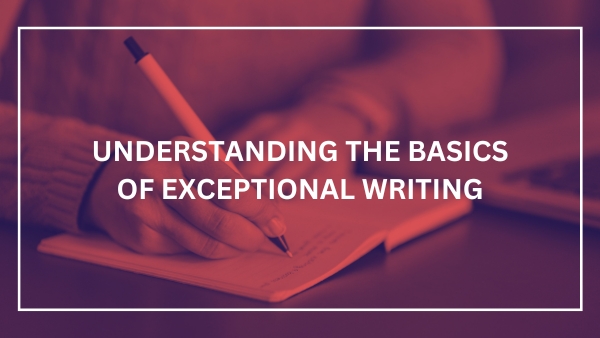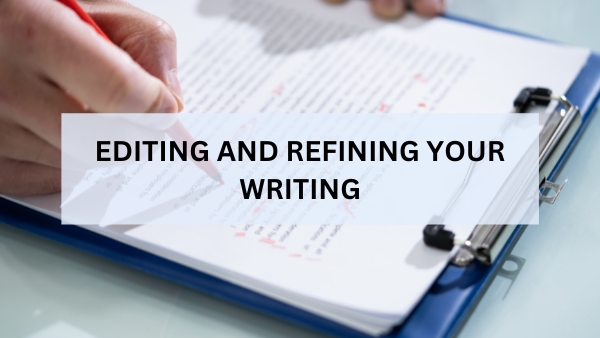Writing is an art form that combines creativity with clarity to communicate ideas in compelling ways. Becoming an exceptional writer requires more than just a good grasp of grammar and vocabulary; it demands an ability to connect with readers on various levels, weaving words into tapestries that evoke emotions and provoke thoughts.
Whether you are a novice looking to craft your first article or a seasoned writer aiming to enhance your style, this guide will provide you with the tools and techniques needed to write with distinction and flair. From mastering the basics to refining sophisticated stylistic elements, we’ll explore how to transform your writing into an engaging and powerful medium for your ideas.
1. Understanding the Basics of Exceptional Writing

Before you can write with flair, you need a solid foundation. This section delves into the fundamentals of good writing, including clarity, coherence, and conciseness. Learn how to construct sentences that are not only correct but compelling.
Clarity
Clear writing starts with clear thinking. Organize your thoughts before you begin to write. Use simple, direct language that leaves no room for ambiguity.
Coherence
Ensure that your writing flows logically from one point to the next. Use transitions effectively and structure your paragraphs in a way that guides the reader smoothly through your text.
Conciseness
Brevity is the soul of wit. Eliminate unnecessary words and focus on getting your message across with precision.
2. Techniques to Enhance Your Writing Style

To write with flair, you need to develop a style that is uniquely yours. This section covers various stylistic techniques that can help you enhance your writing.
Use of Active Voice
Active voice makes your writing stronger and clearer by showing who is doing what. It adds immediacy and engagement to your prose.
Sensory Details
Incorporate sensory details to bring your descriptions to life. Let your readers see, hear, smell, taste, and touch the world you’re describing.
Metaphors and Similes
Use metaphors and similes to make abstract concepts tangible and to add depth to your descriptions.
3. Crafting Compelling Content

Writing that resonates with readers often involves telling a story. This part of the article explains how to craft content that is not only informative but also engaging.
The Power of Storytelling
Learn how to use narrative techniques in your writing to capture the interest of your readers and keep them engaged from start to finish.
Creating Memorable Characters
Even if you’re writing non-fiction, bringing in characters can add a human element that readers can relate to.
Building Suspense
Keep your readers intrigued with suspenseful setups that promise and deliver satisfying conclusions.
4. Editing and Refining Your Writing

No first draft is perfect. This section provides tips on how to effectively edit and refine your writing to achieve excellence.
Revision Strategies
Discover techniques for revising your drafts, including reading aloud, getting feedback, and taking breaks to return with fresh eyes.
Grammar and Style Checks
Use tools and checklists to ensure that your writing is not only stylish but also grammatically flawless.
Avoiding Common Pitfalls
Learn about common writing mistakes and how to avoid them in your work.
5. Staying Inspired and Motivated

Consistent writing requires constant inspiration. Find out how to keep yourself motivated and inspired in your writing journey.
Setting Writing Goals
Setting realistic writing goals can help you stay on track and measure your progress.
Finding Inspiration
Explore various ways to find writing inspiration, from reading widely to engaging in creative exercises.
Joining Writing Communities
Connect with other writers to exchange ideas, receive support, and keep your creative juices flowing.
Conclusion
Writing with flair involves a blend of solid technical skills and a unique personal style. By understanding the basics, employing stylistic techniques, crafting compelling content, and continuously refining your work, you can elevate your writing from ordinary to exceptional. Embrace the journey and let your words leave a lasting impact on your readers.
FAQs
Q1: How often should I practice writing to become better?
Answer: Practice as often as you can, ideally daily. Even short, focused sessions can significantly improve your skills over time.
Q2: Can reading improve my writing?
Answer: Absolutely. Reading widely exposes you to different styles, vocabularies, and ways of thinking that can deeply enrich your own writing.
Q3: What is the best way to deal with writer’s block?
Answer: Try stepping away from your work for a while, engage in a different creative activity, or change your environment to spark new ideas.
Q4: Are writing workshops worth it?
Answer: Writing workshops can provide valuable feedback and structured learning, making them a worthwhile investment for many writers.
Q5: How important is feedback to improving writing?
Answer: Feedback is crucial as it provides outside perspectives on your strengths and weaknesses, helping you to grow as a writer.
Author Profile

- Nitin Jain - C.E.O - India PR Distribution
- Nitin Jain is the founder and C.E.O of India PR Distribution - India's top Press Release Distribution and PR Agency. Nitin has more than 20 years of experience in PR, Corporate Communications, Digital Marketing, Branding Strategy and Lead generation.
Latest entries
 Press releaseJanuary 31, 2026A Year of PR in 12 Stories: The Editorial Calendar Every Marketing Leader Can Copy
Press releaseJanuary 31, 2026A Year of PR in 12 Stories: The Editorial Calendar Every Marketing Leader Can Copy EntrepreneursJanuary 5, 2026Nitin Jain Entrepreneur Behind India PR Distribution Success
EntrepreneursJanuary 5, 2026Nitin Jain Entrepreneur Behind India PR Distribution Success Press releaseNovember 20, 2025Meet Nitin Jain: CEO of India PR Distribution
Press releaseNovember 20, 2025Meet Nitin Jain: CEO of India PR Distribution Search OptimizationSeptember 16, 2025What Is Digital PR and Why It Matters for SEO Success
Search OptimizationSeptember 16, 2025What Is Digital PR and Why It Matters for SEO Success

